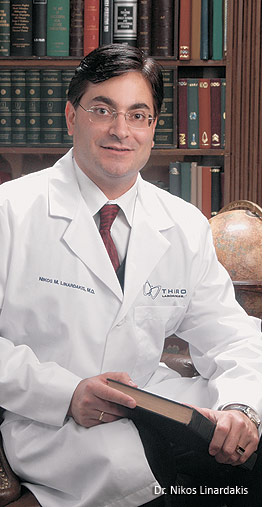 Nikos Linardakis is a medical doctor who runs his own company (Tharos Laboratories, which markets a leading sleep aid and products from natural ingredients). He’s also an author with scores of titles to his credit (from standard texts on microbiology, pharmacology and pathology to cookbooks and novellas and a Michael Creighton-style thriller called Cigar). He’s also a musician who played with his brothers in a band for years (The Linardakis Brothers) and still has his house plugged in like a studio.
Nikos Linardakis is a medical doctor who runs his own company (Tharos Laboratories, which markets a leading sleep aid and products from natural ingredients). He’s also an author with scores of titles to his credit (from standard texts on microbiology, pharmacology and pathology to cookbooks and novellas and a Michael Creighton-style thriller called Cigar). He’s also a musician who played with his brothers in a band for years (The Linardakis Brothers) and still has his house plugged in like a studio.
And now Nikos Linardakis is becoming a moviemaker and combining many of his loves to produce a film based on the dark and stormy Harry Mark Petrakis novel, In The Land of Morning. Olive Film Productions (the name of Linardakis’ production company), is already in pre-production on the film, Petrakis has collaborated with his son John on the writing of the script, and shooting is slated to start on location in Chicago in the spring.
“This is something I’m doing as an act of art and passion, more than anything else,” says the 39-year-old Linardakis, who seems to do most things as an act of passion and whose conversation endlessly percolates with all the passions he has. “I think I’ve read every book that Petrakis has written two or three times. I love his writing, and he’s a real professional. I live by a motto, and I tell people this, that when you care about something, you really must get involved all the way down to the bottom line on every level and that’s the way I am.”
Besides a script by the Petrakis’, the film will feature Mario Frangoulis producing and performing the theme song with his long-time producer and composer Steve Wood, and renowned bouzouki player Alex Galas performing on the score as well.
“I have a strong musical background with my brothers and my part is to make sure that we can produce a professional recording,” says Linardakis, who played with his brothers in their band all over Chicago. “Which means an all-original score for the movie, so we can hopefully get nominated for an original score, and also to make sure we have at least one or two songs that will make it to mainstream radio.”
The time has come also for a film like this to make it into the mainstream, he says, which might not have been possible five years ago.
“I felt like the last two years Greek themes are starting to surface more, most recently with Frank Miller’s film, 300, even though that’s based on a graphic novel,” he says. “I really feel like the Spanish community is networked and they have music and movies and books out there, and there really should be enough room to publish as many Greek books and movies in this Greek arena as we possibly can, as well.”
He says “if we don’t keep this up, this next generation is going to lose out not only on the language and music, but also on the understanding of the arts that made us Greeks throughout history. You ask some high school students now if they’ve ever read Petrakis and none of them even know the name, or if you ask them about Kazantzakis, they have no idea. My Big Fat Greek Wedding was a comedy and people appreciated it from the comedy standpoint, but I want to see more of tradition, more of the arts, more of the heritage: Aesop’s Fables is being lost and being replaced by computer games.”

Petrakis, he says, represents modern Greek tragedy, and how it affects family and religion, “and I really think it’s important for me to see this become a movie while he still is here on earth. It would be an honor for me to see this happen and have the film shown in theaters with him and his sons and his family there to see it.”
Linardakis says he began to read Petrakis when he was ten years old, starting with Nick the Greek, and quickly went through all the novels and short stories (his ultimate ambition is to film the Petrakis epic of the Greek revolution, The Hour of the Bell), and he soon began to write himself.
“I think I published my first book at the age of like 20,” he says. “It was a medical book, Digging Up the Bones, a medical review series, I self-published it and then sold the rights to McGraw-Hill. I have published close to 14 or 15 books, among them two cookbooks, one novella that I’m hoping will be published shortly called Morning Café, and two sleep medicine books: one for children called Sleep Disorders, and one called Ten Natural Ways to a Good Night’s Sleep.”
One cookbook, Recipes Sworn to Secrecy: An International Collection of Family and Favorite Recipes, he wrote with his wife, Connie, who collected the recipes, while he filled in some of the medical “dialogue” and also helped out with the recipes.
Medicine does remain his first love, however, but in keeping with his pioneering and entrepreneurial spirit, he doesn’t practice it in the usual ways. Besides authoring the endless stream of his medical books (which began as a means for him to condense and digest his textbooks at school) he also started Tharos Laboratories (named after the Greek word for courage) four years ago to explore new medicines for age-old diseases.
“I’ve got this mission that I want to build the best phytochemical company in the world that will take the ingredients for our products from natural fruits and plants,” he explains. “This requires a lot of money, a lot of high-tech research, a lot of science, but the end result is that I can help thousands of people versus helping just a few a day.”
The company has a patent on a product called Procidin, which comes from the red and blue pigment in berries and is a natural antibacterial. “It promotes bacterial anti—adhesion,” he says. “It doesn’t kill the bacteria, but stops it from adhering to the cell walls in the body. In women, for example, who have urinary tract health problems, the bacteria can accumulate in the urinary tract and cause an infection. The goal of Procidin is to stop the accumulation of the bacteria so that when a person urinates the bacteria just falls off and there is no abundance of bacteria left.”
Procidin launched on the market last year after three years of development in partnership with Rutgers University. (The company website is tharoslabs.com).
Linardakis has also worked with HGM Medical Laser Systems of Salt Lake City (where he lives) to create a laser educational program that became a runaway success and a favorite of his own “because it got me out to teach and travel and produce a laser teaching book and internal material for the company and laser surgeons.”
True to his restless spirit, though, with the money he made from HGM, he went into something completely different: the pizza business. “Since I was two years old we were eating Connie’s pizza in Chicago and it was a family-run business,” he explains. “Again I like the best and Connie’s really had the best Chicago pizza and they’ve had it in the family since 1963.”
He convinced the family to let him open some branches, and he launched the first one in Salt Lake City in 1998. “My goal was to open one every six months, and I did that through partnerships: we built one with Larry Miller, for example, who owned Utah Jazz, and that opened up another arena, which was the frozen food division of the company in Chicago that was being developed. My goal was to make sure the frozen version of the pizza was kept at the same quality as the actual pizza in the restaurant. This brought us cinemas as customers, Century Theaters for one, which opened theaters left and right that included our frozen pizza.”
Inevitably, though, he came back to his original passion for the arts, which made him start Olive Film Productions to produce films from quality literature, starting with Petrakis.
“It requires a lot of talent, expertise and locations,” he says. “In the Land of Morning was one that required only one location, in Chicago, and the story is the modern-day version of a Greek tragedy. To me there’s a lot of pieces in the movie that bring out the Greek heritage. It has enough in it that could match the purpose of the company to develop Greek-spirited themes in the best tradition.”
The chances of success are good, he says, “if you have the right resources in people and management, and if you add the fact that you’re filming our best writer and the best of his books. That is why I think that our level of success is going to be pretty high.”